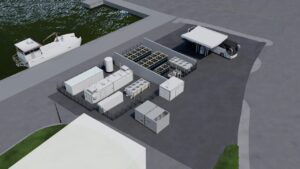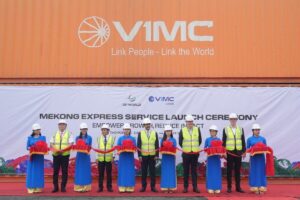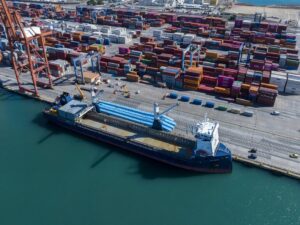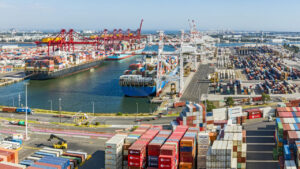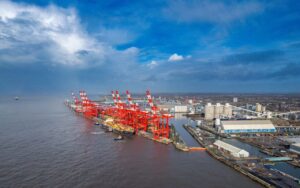Following the acquisition of global logistics leader INTTRA by supply chain network E2open, Port Technology spoke to President and Chief Operating Officer Inna Kuznetsova (IK) about the company's future and what the takeover means.
In the first instalment of a two-part interview, part one explores how INTTRA and E2open will strengthen each other, the importance of adapting to changes in the industry, and the problems that can be solved through collaboration.
PTI: Could you explain what additional benefits and capabilities INTTRA will bring to E2open following this acquisition?
IK: First of all, INTTRA is the largest network in ocean shipping and has over 60 carriers, 35,000 shippers and 150 strategic alliances working within its community.
E2open is also a network, but it is a network operating within the supply chain. It connects a large number of BCOs with their suppliers and central providers.
Read more: E2open Acquires Logistics Leader INTTRA
Providing access to their logistics vendors is the first step. This will be very beneficial for all E2open customers, as INTTRA can help them to execute ocean shipping transactions.
This means they will able to start booking their containers electronically, as well as having access to tracking information provided by INTTRA. There will also be much greater visibility as to where their containers are located.
In the long run, they would be able to take advantage of new products that both companies will be able to create together. In terms of the main direction and potential for these products, the combination of data and logistics creates a wonderful opportunity.
PTI: What problems can be solved by the two companies working together?
IK: The access to data in both companies' networks could be the key to solving problems. Difficulties emerge today whenever there is a delay to your container's route, and in most cases, you don't even know what is in each container.
You may know the container number and the commodity code, but with E2open's access to inventory management, shipping orders and procurement details, merging this information can show you exactly what is being delayed.
The next step is deciding what to do about the delay.
Collaboration was a key topic of discussion at this year's Smart Ports and Supply Chain Technologies Conference: read Port Technology's Day One Review
In some cases, the shipping manager or freight forwarder executing a deal may look at inventory management from the other side; there is a delay for three days but there are four days of inventory. In this example, the delay does not really present a sufficient issue.
In other cases, a decision might be made to carry out a new shipment.
This explains how access to data that is stored in two different networks may potentially help freight forwarders and shippers get much better value going forward.
PTI: What is INTTRA's vision for the future, both for the company and the industry as a whole?
IK: First of all, we will see much more connectivity between a variety of data sources.
A couple of years ago, we published a white paper called “Blocktrade 2032”, which predicted that a growth in digitalisation will provide a cost-effective way for companies to connect with each other. That prediction is coming true as we speak.
We have also spoken about the improved interconnection between operational data and financial data, as well as ocean container movements and land container movements.
We are already seeing this connectivity being introduced and executed by some companies, but there is a still a lot of room for growth.
Inna Kuznetsova, Karim Jumma and Peter Spellman, of INTTRA, discuss how AI can power growth in a recent Port Technology technical paper
INTTRA will participate in all of this and continue to grow its network. We have been very successful to date, but there are still some customers who persist with manual operations.
INTTRA will also work further in the area of connecting data sources, helping the industry move towards a more intelligent supply chain.
The merger with E2open and the possibility to provide more value to BCO's by connecting them with freight forwarders and carriers is a good example.
The carriers will get access to data for costing and be able to plan and their resources more effectively. The freight forwarders will give their customers and providers better connectivity, as well as being able to plan shipments more efficiently.
INTTRA will remain at the forefront of the industry delivering these improvements.
The company wants to continue being a standard-setter as well, because the lack of common standards is getting in the way of connecting data sources.
We see the need for a neutral platform, like INTTRA, to step up and work with multiple players within the industry to develop standards.
We also need to consider how we use the data for predictive analytics, apply machine learning, and create value from this data for the industry.
Read the second part of Port Technology's exclusive interview with Inna Kuznetsova
Inna Kuznetsova:
Inna Kuznetsova is President and Chief Operating Officer of INTTRA, leading sales, service delivery, marketing, strategic alliances, product management, IT infrastructure and software development.






